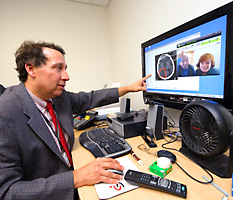Don's Story
Right Here, Right Now 
When Don Henley was rushed to Holy Cross Hospital's Emergency Center with numbness in his fingers, the experienced stroke response team knew exactly what to do: check his symptoms and condition, order CT and MRI scans right away, and immediately discuss the best possible treatment with the stroke program's leader, Andrew Barbash, MD, medical director of Neuroscience.
Within moments, Dr. Barbash was reviewing Don's scans, talking to the team and ordering more advanced tests. And he was doing all of this from a laptop computer in his parked car.
"I always have my computer and a wireless air card," Dr. Barbash says. "So when I got the team's message about Don, I pulled over and asked them to send the scans and other reports. I could see exactly what was going on, in real time, and talk with the staff through my computer. It was as though I was right in the Emergency Center with them at that very moment."
That innovative use of technology - combined with Holy Cross Hospital's expertise as a designated Primary Stroke Center - helped save the retired business consultant's life.
All Together Now
It all started when Don, 74, felt that something strange was happening to him. He called his wife, Angela, at work and received the best advice anyone could give: Dial 911. And unlock the door so the ambulance crew can get in if you pass out.
When he arrived at Holy Cross Hospital, the stroke team confirmed that Don had experienced a transient ischemic attack, or TIA. This kind of stroke is often a warning sign that a major stroke may follow. Tests revealed that Don's right carotid artery, one of the two main vessels that deliver blood and oxygen to the brain, was 90 percent blocked.
"It can be awfully hard to get several busy specialists and the patient all together, all at one time, especially in an emergency," Dr. Barbash says. "Yet today's technology makes it so simple. All you need is a good computer, Internet access, speakers and a webcam to simultaneously connect a group of experts.
For very complex cases, experts from across town or across the country can all see exactly the same images and tests, discuss them, and decide on the best treatment, saving precious time and lives." Family members also may be included in these virtual conversations to better understand their loved one's condition and treatment options.
Every Step of Care, From Here to There
Dr. Barbash pioneered this "virtualized" model of care for neurosciences at Holy Cross Hospital's stroke program, where giving patients the correct diagnosis and care - and right away - is critical to survival and recovery.
While many hospitals are exploring telemedicine, Holy Cross Hospital, through its Neuroscience Program, is one of very few to have so creatively integrated a variety of existing technologies.
The innovative model streamlines care, consultation and decision making - all of which benefits patients, physicians and family members.
Several days after Don was admitted, he suffered unforeseen complications and ended up spending eight weeks in the hospital's Neuro Critical Care Unit followed by three months at
a rehabilitation facility before going home. All the while, Dr. Barbash continued to see how Don was progressing - both in person and by using his virtual videoconferencing system.
Today, Don and Angela, former Silver Spring residents, live in northern Michigan, where they can be closer to family members. But they still view Dr. Barbash as their physician and arrange for virtual checkups with him on a regular basis.
"Thanks to virtual videoconferencing, Dr. Barbash was involved in every step of Don's care right from the very beginning," Angela says. "It's a great relief to us that he's still able to see how Don's doing in Michigan from his office in Maryland."
Stroke Program Maintains High Marks
Holy Cross Hospital has again successfully completed a stroke recertification survey, meaning we consistently offer the best possible care for stroke patients. To earn this distinction from The Joint Commission, which is the chief accrediting body for health care organizations in the united States, Holy Cross Hospital had to demonstrate compliance with national standards of care for stroke patients.
The Joint Commission had no recommendations for improvement to Holy Cross Hospital's stroke program. Holy Cross Hospital also is recognized by the Maryland Institute for Emergency Medical Services Systems as an advanced primary stroke center.
If you or someone close to you shows one or more signs of stroke - including confusion or trouble speaking, seeing or walking - call 911 immediately. Immediate care can improve the chance of recovery.
